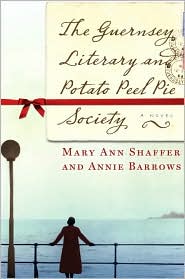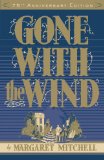At a recent book club meeting, the president made a rather fascinating (to me) comment. To paraphrase her because I have a poor memory, she basically said that she thinks there are two different types of readers – in general. The ones who read for prose first and foremost – i.e. pretty words, clever ways of saying things; and the ones who read for plot first and foremost – i.e. a good story from beginning middle to end.
 Obviously we all hope that a book will come with both, most sadly do not quite hit both targets. That doesn’t always make it a bad book – and if they’ve managed to nail one of them, a lot of people will still like or even love it. Our fearless bookie leader claims that whether a person loves these books comes down to whether they are in it first for the prose or first for the plot. For instance, we would both agree that she is very much in it for the prose. She commented that she can read a book in which nothing happens at all, so long as they say it prettily.
Obviously we all hope that a book will come with both, most sadly do not quite hit both targets. That doesn’t always make it a bad book – and if they’ve managed to nail one of them, a lot of people will still like or even love it. Our fearless bookie leader claims that whether a person loves these books comes down to whether they are in it first for the prose or first for the plot. For instance, we would both agree that she is very much in it for the prose. She commented that she can read a book in which nothing happens at all, so long as they say it prettily.
I, on the other hand, can probably get through a book that is not so polished as long as the story is really good. Hence my adoration for fluffy chick lit and young adult titles. We’ve found the books that she and I both adore tend to be the books that really have the whole package – beautifully written, fascinating story – example: The Guernsey Literary and Potato Peel Pie Society by Mary Ann Shaffer and Annie Barrows. We both really loved this one and I have to agree: beautifully written [check!] amazing plot [double triple check].
 Later in the conversation, someone asked if a book had to have a happy ending to make us Plot-readers happy. I said no, of course not, but then struggled to find an example – the only fitting one I could think of being Gone with the Wind. To which some prose-readers snarled back and commented that they hated that book. And I laughed. And laughed… But it’s true, no real happy ending in Gone with the Wind – an awful lot of unhappy throughout in fact. But even just that promise of tomorrow, when all would be well, was apparently enough for me. I knew Scarlett, of all people, would be okay somehow. She’d get her man or get some new plan of happiness and she’d make it work – no matter what. That’s just her way. And I loved the story. Like adored it with a fiery passion. So it’s all good.
Later in the conversation, someone asked if a book had to have a happy ending to make us Plot-readers happy. I said no, of course not, but then struggled to find an example – the only fitting one I could think of being Gone with the Wind. To which some prose-readers snarled back and commented that they hated that book. And I laughed. And laughed… But it’s true, no real happy ending in Gone with the Wind – an awful lot of unhappy throughout in fact. But even just that promise of tomorrow, when all would be well, was apparently enough for me. I knew Scarlett, of all people, would be okay somehow. She’d get her man or get some new plan of happiness and she’d make it work – no matter what. That’s just her way. And I loved the story. Like adored it with a fiery passion. So it’s all good.
But in general, call me childish, but YES – I prefer books with a happy ending. And you know what? I won’t apologize for it. Because you know what? Life isn’t fair. People are awkward and clumsy and they say the wrong things and they sometimes fumble things up even when they have the best of intentions. And sometimes a tornado or tsunami or other natural disaster will come in and wipe out entire families who had GOOD lives and important things going on but now it’s gone and it doesn’t matter. And wars happen – and people shoot other people – who had families, children, wives, dreams, hopes, et cetera that now don’t matter any more because their story is over.
But fiction is different. A fictional story can happen any way you want it to. It’s entirely up to the author. The characters can say things in the clever way that we hear them in our head before we open our mouths and stutter out an attempt at cool speech that will in real life sound like, “So um what’s for dinner, ahem?” but in fiction can come out, “My darling, I have had the most tiresome of days and all I want now is to sit down with you, my love, over a warm meal and forget about my troubles for awhile because you make me so happy.”
Or something, I don’t know – a good writer would say it even better than that. Because they can. And at the end of the story – the guy gets the girl! The hero saves the day! Because if we want to see a sad ending, we can turn on the news or talk to our neighbors. Sad endings are for real life. Happy endings are for fiction – where we as writers can control every page. Because, I at least, read to be entertained. To escape the real world and enter into the fantasy world where dreams come true and milkmaids become Queens of Florin but then say, “Screw that, I’m going to hook up with the hot pirate instead because I CAN.” The End.
That’s just how I like it. No apologies.
How about you? Do you read for prose first or plot for sure? I know most of us would try to huff and say, “I like both!” I know, so do I, but I do think there comes a point where one becomes suddenly clearly more important at the end of the day. So which is it for you?
Guest Bio: When Jennifer isn’t reading her latest book club’s pick, she can be found blogging about her life as a stay at home mother to two adorable kiddos at mommablogsalot.com. She spends the majority of her time snapping pictures of her two year old and five year old, baking up yummy desserts to ruin her diet and of course blogging and reading. She loves just about every genre from historical fiction to celebrity memoirs, young adult fantasy novels to Jane Austen — preferably with a happy ending!
Great post! I am defnitely plot – all prose, no action drives me nuts!
Me, too! I think that’s the reason I disliked The Scarlett Letter so much. I commented to a friend once that Nathaniel Hawthorne would write an entire book about a brick wall if someone let him. 🙂 And I’d hate being forced to read it! Thanks for the comment!
It depends on what I am reading. For mystery books & general fiction it has to have a good plot or I won’t even bother finishing it no matter how great the prose is. For romance novels I am more of a prose person, but I will stick with mediocre prose for a good plot.
I’m one of the “prose” people. Actually, it’s more character for me, than just the writing. If there’s heavy character development (written well), I don’t mind if “nothing happens.”
But I am aware that many people can stand that, so when I’m reviewing a book, I mention if it’s very character-driven versus plot driven.
Great post. I never really thought of this, but I can see how these preferences would be obvious in a bookclub discussion.
I think that to an extent “character-driven” appeals to me also because I still see it as something happening. I would also say that character driven novels are some of the hardest ones to adapt to movies though for just that reason.
I agree, Jen, that for me that counts as something happening, but for really heavy plot people, that kind of novel still drives them crazy.
I’m all about plot. Pretty words can be nice, but it frustrates me. When I find that I’m just like, “GET ON WITH IT ALREADY!” I don’t have a preference as to whether the plot is driven by action or character.
Oh, plot, most definitely! That doesn’t give authors free reign; I have shelved a few books by the end of the second chapter because of horrible prose (usually occurring in some of the most ridiculous dialog ever written). I guess you could say that I pick up a book for the plot, engage with it through a combination of plot and prose, and read to the end for plot.
I had never thought if I was really more a prose or plot girl, I love most all books, I recently finished The Mill on the Floss which was a tragic ending, but I absolutely loved it. I agree most fiction for me I prefer the happy ending and feel the same way that I read to escape not to be brought down. And though I always probably prefer “prose” the if it’s well written it doesn’t really matter what happens, but if it were to be an unhappy ending I think I’d prefer the tragic novel to be more “prose” somehow a well written tradegy is much more acceptable to me.
Ooh, what a fun discussion! I am definitely more “prose” (as in I love poetry) but sometimes I just want a good story! And, as you said, the best books have both. But sometimes I’ll be reading a supposedly-great book and nothing happens, and it bugs me. Whereas I tend to at least finish even poorly-written books with great plots. Perhaps I am fooling myself, but I do know I will toss the plot-no-prose afterwards, but keep the prose-no-plot to read again at some point.
I definitely lean toward prose, though I don’t want something devoid of plot.
As for a happy ending, I don’t need it to be happy, but I find myself disappointed when there isn’t what I would call “redemption” of some sort. What I mean by that is that the characters have learned or grown in some way – they are changed or affected by the events of the story.
I definitely agree with you about the redemption. I think this is what makes Gone With the Wind’s ending sufficient for me – there was major growth at the very least.
I also agree with that. A tragic ending (or a “depressing” story in general) works for me if there’s been change or if there’s some sort of hope.